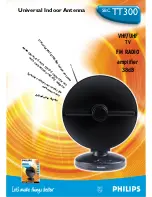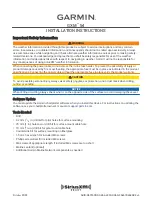
-21-
TECH NOTES—GROUND RADIAL SYSTEMS
In all cases the base of the vertical antenna should
not be more than a few inches away from the MH
or RV so that the shortest possible lead may be run
from the ground connection of the antenna to the
metal body, as the length of this ground lead will
effectively lengthen the antenna itself on all bands,
and detuning can occur in some cases. A good
electrical connection between the body of the RV
or MH and the antenna is important, and in the
case of mobile homes it would be a good idea to
make sure that good electrical contact exists
between the different parts of the metal body. Discontinuities can often lead to
the production of harmonic radiation and TVI. The essential circuit connections
are shown in the diagram above.
For permanent installations the bottom of
the mast may be set deeper in the ground,
and concrete may be used for greater
strength and stability. The upper portion of
the mast should be securely attached to
the side of the building. Steel TV mast
sections are readily available in lengths of
ten feet and the mounting posts of
Butternut HF verticals will slide into those
which have an outside diameter of 1 1/4
inches and a wall thickness of .058 inches.
Other vertical antennas may use different
mounting techniques and requirements, so
be sure to select a mast that will be suited
to the particular situation. The main point
to keep in mind is that the mast should not
extend more than a few inches above the level of the roof so that the ground lead
may be kept short.
LIGHTNING PROTECTION
Modern solid state amateur equipment is particularly vulnerable to damage from
lightning or static induced transients that may appear on transmission lines, and
conventional air-gap lightning protectors may provide no real protection at all for
solid state gear. A line of very effective lightning and static protectors has been
developed by ALPHA DELTA COMMUNICATIONS, P.O. Box 571, Centerville, Ohio
45459, for use with solid state equipment, and since these devices feature much
faster transient discharge times than earlier designs, they should be investigated
for possible use with all vertical and other antenna systems.
Summary of Contents for HF9V
Page 14: ...14 Feedline Detail PICTORIAL...




































